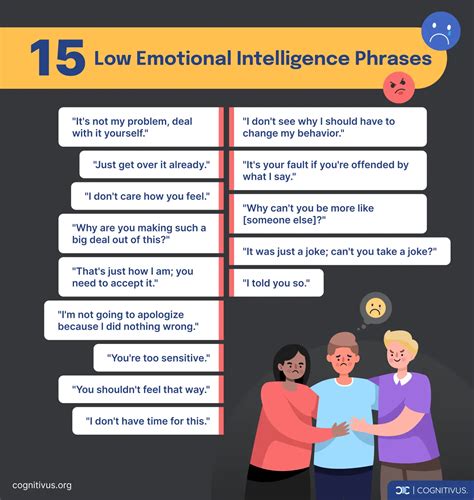
Emotional intelligence in conversations can be fostered by incorporating specific phrases that demonstrate empathy, active listening, and understanding, leading to more meaningful and productive interactions. Experts suggest that using certain linguistic tools can significantly enhance communication skills and build stronger relationships, both personally and professionally.
Incorporating emotionally intelligent phrases into your everyday conversations can significantly improve relationships and foster better communication. According to communication experts, these phrases demonstrate active listening, empathy, and understanding, creating a more positive and productive environment for dialogue.
Building Bridges: Emotionally Intelligent Phrases for Better Conversations
In an increasingly interconnected world, the ability to communicate effectively and empathetically is more crucial than ever. While technical skills and knowledge remain essential, emotional intelligence (EQ) plays a vital role in building strong relationships, resolving conflicts, and fostering a positive environment in both personal and professional settings. A key component of emotional intelligence is the ability to use language that demonstrates understanding, empathy, and active listening. Communication experts have identified specific phrases that can significantly enhance the quality of conversations and strengthen interpersonal connections.
According to experts, emotionally intelligent communication is not just about what you say, but how you say it. It involves being mindful of your own emotions and the emotions of others, and tailoring your language to create a safe and supportive space for dialogue. By incorporating specific phrases into your conversational repertoire, individuals can demonstrate that they are actively listening, understanding different perspectives, and valuing the other person’s feelings. This approach fosters trust, encourages open communication, and strengthens relationships.
The phrases highlighted by experts are not intended to be used as manipulative tactics or insincere platitudes. Rather, they serve as genuine expressions of empathy and understanding, signaling to the other person that you are fully present and engaged in the conversation. When used authentically, these phrases can transform challenging interactions into opportunities for connection and growth.
13 Phrases to Unlock Emotional Intelligence:
The following phrases are recommended by experts to improve communication and foster emotional intelligence in conversations:
-
“Tell me more about that.” This phrase encourages the other person to elaborate on their thoughts and feelings, demonstrating your genuine interest and willingness to listen. It shows that you value their perspective and want to gain a deeper understanding of their experience. Rather than jumping to conclusions or offering unsolicited advice, this phrase creates space for the other person to share their thoughts fully.
-
“That makes sense.” Validating the other person’s perspective, even if you don’t entirely agree with it, is crucial for building rapport and fostering understanding. This phrase acknowledges the logic behind their reasoning and demonstrates that you are trying to see things from their point of view. It doesn’t necessarily mean you endorse their opinion, but it does show that you respect their thought process.
-
“I appreciate your honesty.” Creating a safe space for open and honest communication is essential for building trust. This phrase reinforces the value of candor and encourages the other person to continue sharing their thoughts and feelings openly. It also demonstrates that you are willing to hear potentially difficult or uncomfortable truths, which can be crucial for resolving conflicts and building stronger relationships.
-
“How are you feeling about this?” This question directly addresses the emotional aspect of the conversation, showing that you are attuned to the other person’s feelings and experiences. It encourages them to express their emotions and allows you to respond with empathy and understanding. By acknowledging their emotional state, you create a deeper connection and foster a more supportive dialogue.
-
“I understand.” Conveying empathy and understanding is crucial for building rapport and fostering connection. This phrase shows that you are actively listening and attempting to see things from the other person’s perspective. However, it’s important to use this phrase sincerely and avoid simply parroting it without genuine understanding.
-
“What do you need from me right now?” This question demonstrates your willingness to support the other person and address their specific needs. It shows that you are not just passively listening, but actively seeking ways to help them. This phrase is particularly useful in situations where someone is struggling or overwhelmed.
-
“I’m here for you.” Offering unconditional support can be incredibly powerful in times of stress or difficulty. This phrase reassures the other person that you are there to listen, offer guidance, or simply provide a comforting presence. It demonstrates your commitment to the relationship and your willingness to be a source of support.
-
“Let me see if I understand correctly…” This phrase signals that you are actively listening and attempting to grasp the other person’s message accurately. By summarizing their points, you demonstrate your attentiveness and provide an opportunity for them to clarify any misunderstandings. This also helps to ensure that you are both on the same page.
-
“I hadn’t thought about it that way.” Acknowledging a different perspective can be a sign of intellectual humility and open-mindedness. This phrase demonstrates that you are willing to challenge your own assumptions and consider alternative viewpoints. It fosters a more collaborative and respectful dialogue.
-
“That sounds really difficult.” Validating someone’s experience and acknowledging the challenges they are facing can be incredibly comforting. This phrase shows that you understand the gravity of their situation and that you are empathizing with their struggles. It fosters a sense of connection and support.
-
“It’s okay to feel that way.” Allowing someone to express their emotions without judgment is crucial for creating a safe and supportive environment. This phrase validates their feelings and reassures them that it’s okay to experience a range of emotions, even negative ones. It fosters emotional acceptance and reduces feelings of shame or guilt.
-
“What are your thoughts?” Encouraging the other person to share their opinions and ideas demonstrates your respect for their intelligence and creativity. This phrase fosters a collaborative environment and allows you to benefit from their insights. It also helps to ensure that everyone feels heard and valued.
-
“You’re not alone.” Offering reassurance and support can be incredibly powerful in times of isolation or loneliness. This phrase reminds the other person that they are not the only ones who have experienced similar challenges and that there is a community of support available to them. It fosters a sense of belonging and connection.
The Science Behind Emotionally Intelligent Communication:
The effectiveness of these phrases is rooted in the principles of psychology and communication theory. Research has shown that emotionally intelligent communication can lead to a variety of positive outcomes, including:
-
Improved Relationships: When individuals feel understood and validated, they are more likely to trust and connect with others. Emotionally intelligent communication fosters a sense of connection and belonging, strengthening relationships both personally and professionally.
-
Reduced Conflict: By actively listening and empathizing with others, individuals can de-escalate conflicts and find mutually agreeable solutions. Emotionally intelligent communication helps to bridge differences and foster a more collaborative approach to problem-solving.
-
Increased Productivity: In the workplace, emotionally intelligent communication can lead to increased productivity and job satisfaction. When employees feel valued and supported, they are more likely to be engaged and motivated.
-
Enhanced Mental Well-being: Emotionally intelligent communication can also have a positive impact on mental well-being. By expressing emotions in a healthy way and building strong social connections, individuals can reduce stress and improve their overall sense of well-being.
Cultivating Emotional Intelligence:
While some individuals may be naturally more emotionally intelligent than others, these skills can be learned and developed through practice and self-awareness. Here are some tips for cultivating emotional intelligence:
-
Practice Active Listening: Pay attention to both the verbal and nonverbal cues of the other person. Focus on understanding their perspective rather than formulating your response.
-
Develop Empathy: Try to put yourself in the other person’s shoes and imagine how they might be feeling. Consider their background, experiences, and motivations.
-
Manage Your Emotions: Learn to recognize and regulate your own emotions. Avoid reacting impulsively or defensively.
-
Communicate Assertively: Express your needs and opinions in a clear and respectful manner. Avoid being passive or aggressive.
-
Seek Feedback: Ask for feedback from trusted friends, family members, or colleagues on your communication skills. Be open to constructive criticism and willing to make changes.
-
Read and Learn: Explore books, articles, and other resources on emotional intelligence. Consider taking a course or workshop to further develop your skills.
Beyond Phrases: The Importance of Authenticity:
While incorporating specific phrases into your conversations can be a helpful starting point, it’s important to remember that authenticity is key. The phrases highlighted by experts are not intended to be used as manipulative tactics or insincere platitudes. Rather, they should be genuine expressions of empathy and understanding.
If you are not sincere in your attempts to connect with others, your efforts may backfire. People can often sense when someone is being disingenuous, and this can damage trust and credibility. Therefore, it’s important to cultivate a genuine desire to understand and connect with others.
The Role of Nonverbal Communication:
In addition to verbal communication, nonverbal cues such as body language, facial expressions, and tone of voice also play a crucial role in conveying emotional intelligence. Maintaining eye contact, nodding your head to show understanding, and using a warm and friendly tone of voice can all enhance the impact of your words. Conversely, avoiding eye contact, crossing your arms, or speaking in a sarcastic tone can undermine your efforts to connect with others.
Emotional Intelligence in a Digital Age:
In an increasingly digital world, it’s important to consider how emotional intelligence applies to online communication. While it can be more challenging to convey empathy and understanding through text-based communication, there are still ways to connect with others on an emotional level. Using emojis, carefully choosing your words, and responding promptly can all help to create a more positive and supportive online environment. However, it’s important to note that written communication can easily be misinterpreted. When communicating online, it is often best to err on the side of caution.
The Future of Emotional Intelligence:
As technology continues to advance and the world becomes increasingly complex, emotional intelligence will become even more critical for success in both personal and professional life. Individuals who can effectively communicate, collaborate, and build relationships will be highly sought after in the workplace. Moreover, emotionally intelligent individuals are more likely to thrive in a rapidly changing world. By investing in the development of emotional intelligence, individuals can enhance their communication skills, build stronger relationships, and create a more positive and fulfilling life.
Examples of the Phrases in Action:
Here are some examples of how these phrases can be used in different situations:
-
Scenario: A colleague is struggling with a challenging project.
- Instead of: “Just work harder.”
- Try: “That sounds really difficult. What do you need from me right now?”
-
Scenario: A friend is feeling down about a personal setback.
- Instead of: “You’ll get over it.”
- Try: “I’m here for you. Tell me more about what you’re feeling.”
-
Scenario: A family member expresses a different opinion on a controversial topic.
- Instead of: “You’re wrong.”
- Try: “I hadn’t thought about it that way. What are your thoughts?”
By consciously incorporating these phrases into your everyday conversations, you can cultivate a more empathetic, understanding, and emotionally intelligent communication style. This, in turn, will lead to stronger relationships, improved communication, and a more positive and fulfilling life.
FAQ about Emotionally Intelligent Phrases in Conversations
1. What is emotional intelligence and why is it important in conversations? Answer: Emotional intelligence (EQ) is the ability to understand and manage one’s own emotions, as well as recognize and influence the emotions of others. In conversations, EQ is vital because it fosters empathy, active listening, and mutual understanding, leading to more effective communication, stronger relationships, and conflict resolution. High EQ helps individuals navigate complex social interactions, build trust, and create a positive communication environment. “Emotional intelligence involves being mindful of your own emotions and the emotions of others, and tailoring your language to create a safe and supportive space for dialogue.”
2. How can using specific phrases improve my communication skills? Answer: Specific phrases can enhance communication by demonstrating active listening, empathy, and validation of the other person’s feelings and perspectives. Phrases like “Tell me more about that” encourage elaboration, while “That makes sense” validates the speaker’s viewpoint. These expressions show respect and understanding, fostering a more open and productive dialogue. Authentically incorporating such phrases can transform potentially difficult conversations into opportunities for connection and growth.
3. Are these phrases meant to be used in all types of conversations? Answer: While the phrases are generally applicable, their effectiveness depends on the context and sincerity of the user. They are most useful in situations where you want to build rapport, resolve conflicts, or offer support. However, they should be used genuinely and not as manipulative tactics. Being mindful of the specific dynamics of each conversation and tailoring your language accordingly is crucial. Authenticity is key to making these phrases effective.
4. How do I avoid sounding insincere when using these phrases? Answer: To avoid sounding insincere, ensure that your words align with your genuine feelings and intentions. Practice empathy by truly trying to understand the other person’s perspective before responding. Use these phrases thoughtfully and selectively, rather than mechanically. Nonverbal cues, such as maintaining eye contact and nodding, can also reinforce your sincerity. The goal is to demonstrate that you are truly engaged and present in the conversation.
5. Can emotional intelligence be developed, or is it an innate trait? Answer: While some individuals may naturally possess higher EQ, emotional intelligence can be developed through practice, self-awareness, and conscious effort. By actively practicing active listening, managing emotions, and seeking feedback, individuals can improve their EQ over time. Resources such as books, articles, courses, and workshops can further enhance these skills. Continuous self-improvement and a willingness to learn are key to developing emotional intelligence.









